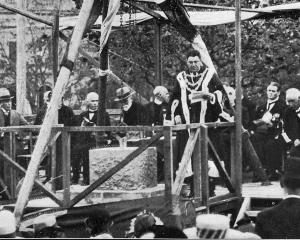
The seizure of the initiative by the Allies has been productive of highly important military results. Whatever, the full significance of these may yet be shown to be, the immediate effect, we are entitled to believe, is the complete failure of another phase of the enemy's great offensive. The German official despatches may discount the success of the Allies as they will, but they cannot disguise the facts that the Allies are now established at and beyond Chateau Thierry, that they dominate Soissons, and that the Germans themselves have paid a bitter price for their initial success in crossing the Marne.
Turbulent ferry trip
A Press Association telegram from Christchurch states that on her trip from Wellington on Monday night the Maori experienced what was probably the roughest and most prolonged passage in her history. The vessel left Wellington at 3.19 in the afternoon, and immediately on emerging from Wellington Heads was caught by a southwest gale of hurricane force. The wind and a heavy sea reduced the vessel's speed to about five or six knots per hour and swept the decks frequently. At 9.5 p.m. she had reached Cape Campbell, where blinding snow showers were encountered. The vessel progressed about six or eight knots per hour, the opaque atmosphere making navigation difficult. Captain Manning, however, managed to keep the vessel well within her course. The trip occupied 20 hours - roughly eight hours longer than is usually taken by the Maori.
Widespread snow
KOKONGA, July 22: Very severe weather conditions still prevail here. On Saturday night four inches of snow fell, and yesterday a strong southwest gale piled it in drifts. There was another similar fall of snow last night, and a high wind, and this morning the snow is drifted in places up to four feet. Last night was the coldest night during the past three weeks. The thermometer registered two degrees below zero.
OTUREHUA, July 22; A bitterly cold wind accompanied by frequent heavy showers of snow commenced about 4 p.m on Saturday, and continued until a late hour this morning. The snow drifted to such an extent that it is difficult to say what amount fell, but probably six inches would be a fair estimate. It was one of the most severe storms experienced here for years. Twelve degrees of frost were registered yesterday morning, and the thermometer continued below freezing point all day yesterday.
MIHIWAKA, July 23: The Mihiwaka district has been visited by a very severe snowstorm, the worst known in the district for a very long time. In the Blueskin end of the district the main road is blocked by drifts up to 12ft. The junction of this road and the Mopanui road is quite impassible for vehicular traffic. The fences are quite covered. Stock are having a rough time and some of the animals have been fed by falling the bush trees. The sheep are now quite safe, having found refuge in the bush. Today, a good thaw is setting in, and plenty of feed is now available.
- ODT, 24.7.1918












